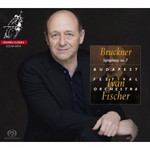|
Back
07/30/2014
Anton Bruckner: Symphony No. 7
Budapest Festival Orchestra, Iván Fischer (conductor)
Recorded in Budapest, Hungary – 56’45
Channel Classics CCS SA 33714
Hybrid Multi-Channel Super Audio CD with booklet, essays in English, German, and French

   
I must begin with a confession: Bruckner is difficult for me. By that I mean that, in the company of Beethoven, Mahler, and his hero Richard Wagner, Bruckner’s music has seemed second-rate to me. Too often, performances strike me as extreme, Romantic Sturm und Drang if you will, lacking in subtlety. Several years ago I attended a matinee performance of this piece that was so earth-shattering that I left with a not-insignificant headache the remainder of the day.
Leave it to Iván Fischer to turn my perception on its head. What makes Fischer so intriguing isn’t just his programming or his outspokenness, it is the total commitment to his interpretation that he demands and his players provide. There likely isn’t a better example of this phenomenon in Fischer’s discography than this recording.
This is not your father’s Bruckner, and thank goodness.
Fischer’s band weaves, dances, and sings throughout this recording. Playing with virtually no vibrato, this music is refreshingly transparent. The chamber-like sonorities Fischer achieves here are breathtaking. Even at its most potent, the forces are never strained.
In tempi, Fischer avoids shocking extremes, opting instead for cohesiveness. The first movement in particular refrains from segmentation, transitioning seamlessly, all the while flawlessly executed by the players. There are still peaks and valleys, but Fischer exploits the pregnant lyricism and humor of Bruckner’s inner voices to keep the listener’s attention. The second movement “Adagio,” inspired by the composer’s hero, Wagner, refrains from overt sentimentality, opting for more poignancy with those three quarter-notes of the theme carefully phrased in each occurrence.
The third movement, “Scherzo,” maintains plenty of wit at its moderate tempo. Fischer keeps things graceful and lyric while keeping one eyebrow raised. It is more musical riddle than roller coaster. The finale courses to its noble conclusion briskly. Much like preceding movements, Fischer declines to draw it out.
This is not to say that this recording lacks drama. On the contrary, one of the main features of its effectiveness is Fischer’s ability to shape each movement with a dramatic arc that is more coherent than manic. A prime example is at the “Tempo I (molto animato)” of the first movement. The full force of the orchestra is massive, organ-like, compared to the delicate phrases that preceded it. There is no trace of passivity here and Fischer makes it his arrival point with remarkable persuasion.
The sound quality is first-rate, as always. The multi-channel surround is warm and enveloping with the bass detail, in particular, some of the best I’ve heard from a large orchestra. I did notice a sudden “hiss” about 14’30” through the first movement that lasted nearly half a minute, but the larger point still stands.
In the end, the magnificence of the BFO’s playing cannot be overstated. The uniformity of color across the sections is breathtaking. The brass, strings, and woodwinds share every nuance of attack, release, and weight of sound. Some may not enjoy this recording. It comes in at around 8 minutes shorter than Karajan’s recording with the Berliners. As a musical achievement however, this recording is historic in its vision and execution. Simply put, I can’t stop listening to it. It is endlessly refreshing, enjoyable, and downright stunning. More Bruckner, please.
Matthew Richard Martinez
|